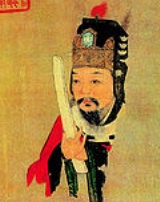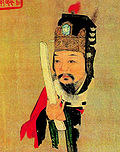
Fan Zhongyan
Encyclopedia
| Names Chinese name Personal names in Chinese culture follow a number of conventions different from those of personal names in Western cultures. Most noticeably, a Chinese name is written with the family name first and the given name next, therefore "John-Paul Smith" as a Chinese name would be "Smith John-Paul"... |
|
|---|---|
| Xìng 姓 Chinese surname Chinese family names have been historically used by Han Chinese and Sinicized Chinese ethnic groups in mainland China, Taiwan, Hong Kong, and among overseas Chinese communities. In ancient times two types of surnames, family names and clan names , existed.The colloquial expressions laobaixing... : |
Fàn 范 |
| Míng 名 Chinese given name Chinese given names are generally made up of one or two characters, and are written after the family name, therefore "John-Paul Smith" as a Chinese name would be read "Smith John-Paul". Chinese names can consist of any character and contain almost any meaning... : |
Zhòngyān 仲淹 |
| Zì 字: | Xīwén 希文 |
| Shì 謚 Posthumous name A posthumous name is an honorary name given to royalty, nobles, and sometimes others, in East Asia after the person's death, and is used almost exclusively instead of one's personal name or other official titles during his life... : |
Wénzhèng 文正¹ |
 |
|
| 1. hence referred to as Fàn Wénzhènggōng 范文正公 |
|
Fan Zhongyan (989-1052), born in Wuxian (吳縣), Suzhou
Suzhou
Suzhou , previously transliterated as Su-chou, Suchow, and Soochow, is a major city located in the southeast of Jiangsu Province in Eastern China, located adjacent to Shanghai Municipality. The city is situated on the lower reaches of the Yangtze River and on the shores of Taihu Lake and is a part...
(in Jiangsu
Jiangsu
' is a province of the People's Republic of China, located along the east coast of the country. The name comes from jiang, short for the city of Jiangning , and su, for the city of Suzhou. The abbreviation for this province is "苏" , the second character of its name...
province today), was a prominent politician and literary figure in Song dynasty
Song Dynasty
The Song Dynasty was a ruling dynasty in China between 960 and 1279; it succeeded the Five Dynasties and Ten Kingdoms Period, and was followed by the Yuan Dynasty. It was the first government in world history to issue banknotes or paper money, and the first Chinese government to establish a...
China
China
Chinese civilization may refer to:* China for more general discussion of the country.* Chinese culture* Greater China, the transnational community of ethnic Chinese.* History of China* Sinosphere, the area historically affected by Chinese culture...
. He was also a strategist and educator. After serving the central government of the state for many years he finally rose to the seat of chancellor
Chancellor
Chancellor is the title of various official positions in the governments of many nations. The original chancellors were the Cancellarii of Roman courts of justice—ushers who sat at the cancelli or lattice work screens of a basilica or law court, which separated the judge and counsel from the...
over the whole of the Chinese empire.
Early Official Career
In the 1030s, Fan served as the prefect of KaifengKaifeng
Kaifeng , known previously by several names , is a prefecture-level city in east-central Henan province, Central China. Nearly 5 million people live in the metropolitan area...
. While there, he took on a young Ouyang Xiu
Ouyang Xiu
Ouyang Xiu was a Chinese statesman, historian, essayist and poet of the Song Dynasty. He is also known by his courtesy name of Yongshu, and was also self nicknamed The Old Drunkard 醉翁, or Householder of the One of Six 六一居士 in his old age...
as a disciple; a partnership that would become very important a decade later. However, after criticizing the Chief Councillor of the Song state when he submitted a proposal to reform criteria used in the advancement and demotion of officials, he was demoted to regional government.
Fan was recalled in 1040 when the Liao
Liao Dynasty
The Liao Dynasty , also known as the Khitan Empire was an empire in East Asia that ruled over the regions of Manchuria, Mongolia, and parts of northern China proper between 9071125...
and Western Xia
Western Xia
The Western Xia Dynasty or the Tangut Empire, was known to the Tanguts and the Tibetans as Minyak.The state existed from 1038 to 1227 AD in what are now the northwestern Chinese provinces of Ningxia, Gansu, eastern Qinghai, northern Shaanxi, northeastern Xinjiang, southwest Inner Mongolia, and...
once again threatened Song borders from the north. Fan, who had long favored a strong defense, was brought back to devise a response to the northern threat.
Qingli Reforms
After the Song granted Western XiaWestern Xia
The Western Xia Dynasty or the Tangut Empire, was known to the Tanguts and the Tibetans as Minyak.The state existed from 1038 to 1227 AD in what are now the northwestern Chinese provinces of Ningxia, Gansu, eastern Qinghai, northern Shaanxi, northeastern Xinjiang, southwest Inner Mongolia, and...
indemnities similar to those granted the Liao
Liao
Liao can mean:* Liao Dynasty , a former dynasty in northern China founded by the Khitan people**Northern Liao , state founded by the Khitans in northern China...
in the Treaty of Shanyuan, Fan, along with other advocates of Confucian ideals, sought reform at the court. He presented a ten-point proposal covering various aspects of government administration, including reforms to the recruitment system, higher pay for minor local officials to discourage against corruption, and wider sponsorship programs to ensure that officials were drafted more on the basis of their intellect and character. However, many of the reforms that he introduced met with the opposition of conservative ministers who felt the system did not need drastic changes (and who felt threatened by the prospect of change halfway through their careers as state bureaucrats). The emperor rescinded the reforms in 1045, after Fan and his friend and colleague Ouyan had been charged with forming a faction, which was considered subversive by definition. Nevertheless, his idealist approach to governance inspired others, like the later Chancellor Wang Anshi
Wang Anshi
Wang Anshi was a Chinese economist, statesman, chancellor and poet of the Song Dynasty who attempted controversial, major socioeconomic reforms...
.
Educational reforms
Fan also began educational reforms in the 1040s. In the early Northern Song era, prefecturalZhou (political division)
Zhou were historical political divisions of China. Formally established during the Han Dynasty, zhou continued to exist until the establishment of the Republic of China — a period of over 2000 years...
schools were neglected by the state and were left to the devices of wealthy patrons who provided private finances. While Chancellor, Fan Zhongyan issued an edict that would have a combination of government funding and private financing to restore and rebuild all prefectural schools that had fallen into disuse and abandoned since the Five Dynasties and Ten Kingdoms (907-960). Fan attempted to restore all county-level schools in the same manner, but did not designate where funds for the effort would be formally acquired and the decree was not taken seriously until the later Emperor Huizong of Song who expanded the county-level school system dramatically. Fan's trend of government funding for education set in motion the movement of public schools that eclipsed private academies, which would not be officially reversed until Emperor Lizong of Song
Emperor Lizong of Song
Emperor Lizong 理宗 was the 14th emperor of the Song Dynasty of China, and the fifth emperor of the Southern Song. His personal name was Zhao Yun . He reigned from 1224 to 1264. His temple name means "Reasonable Ancestor"...
in the mid 13th century.
Literary works
Fan Zhongyan's most famous work of literature was Yueyang Lou Ji 岳陽樓記, composed during the reconstruction of Yueyang Lou under the governance of a friend of his. Yueyang Lou, a city gate by the side of Dongting LakeDongting Lake
Dongting Lake, or Lake Dongting is a large, shallow lake in northeastern Hunan province, China. It is a flood basin of the Yangtze River . Hence the lake's size depends on the season...
, was known as one of the three great towers in Southern China, due to their association with famous literary works (the others being Huanghe Lou 黃鶴樓 and Tengwang Ge 滕王閣). This commemorative Ji was written in prose, with extensive usage of phrases in four. It's most famous for the political ideal he expressed at the end, culminating in the oft-quoted altruism
Altruism
Altruism is a concern for the welfare of others. It is a traditional virtue in many cultures, and a core aspect of various religious traditions, though the concept of 'others' toward whom concern should be directed can vary among cultures and religions. Altruism is the opposite of...
"先天下之憂而憂,後天下之樂而樂" (translated as "Feel concern for others under heaven before others, and rejoice after others under heaven have rejoiced" or "Be the first to feel concern about the country and the last to enjoy oneself" or "Bear the hardship and bitterness before others, enjoy comfort and happiness after others")
寧鳴而死,不默而生 (Die from remonstrance rather than live in silence.) is also a quotation. This quote comes from Ling Wu
Bird
Birds are feathered, winged, bipedal, endothermic , egg-laying, vertebrate animals. Around 10,000 living species and 188 families makes them the most speciose class of tetrapod vertebrates. They inhabit ecosystems across the globe, from the Arctic to the Antarctic. Extant birds range in size from...
Fu 《靈烏賦》 in 1036, which was written in reply to a friend (Mei Yaochen 梅堯臣)'s advice. This friend, Mei Yaochen, tried to persuade him to stop bearing so much concern for others "under heaven" (tianxia) and to start caring for his own career and life. In response, Fan told a fable about a spirit bird, using the metaphor to express his aspirations. It embodies the moral integrity, sound conscience, and responsibility for others required of a Shi Da Fu, called "The Moral Responsibilities of Intellectuals".
Fan Zhongyan was known for his ci
Ci (poetry)
Ci is a kind of lyric Classical Chinese poetry using a poetic meter based upon certain patterns of fixed-rhythm formal types. For speakers of English, the word "ci" is pronounced somewhat like "tsuh"...
(詞賦) poetry. Among the most famous are Su Mu Zhe (蘇幕遮) and Yu Jia Ao (漁家傲). Together with Su Shi
Su Shi
Su Shi , was a writer, poet, artist, calligrapher, pharmacologist, gastronome, and statesman of the Song Dynasty, and one of the major poets of the Song era. His courtesy name was Zizhan and his pseudonym was Dongpo Jushi , and he is often referred to as Su Dongpo...
(蘇軾), he was considered one of the founders of the haofang (豪放) school of ci
Ci (poetry)
Ci is a kind of lyric Classical Chinese poetry using a poetic meter based upon certain patterns of fixed-rhythm formal types. For speakers of English, the word "ci" is pronounced somewhat like "tsuh"...
.
See also
- History of the Song DynastyHistory of the Song DynastyThe Song Dynasty of China was a ruling dynasty that controlled China proper and southern China from the middle of the 10th century into the last quarter of the 13th century...
- Culture of the Song DynastyCulture of the Song DynastyThe Song Dynasty was a culturally rich and sophisticated age for China. There was blossoming of and advancements in the visual arts, music, literature, and philosophy...
- Chancellor of ChinaChancellor of ChinaThe Chancellor , variously translated as Prime Minister, Chancellor of State, Premier or Chief Councillor, was a generic name given to the highest-ranking official in the imperial government in ancient China...
External links
- http://www.silkqin.com/09hist/qinshi/fanzhongyan.htm
- http://www.cctv.com/program/civilization/20040406/101759.shtml
- http://www.chinapage.com/poet-e/fanzhongyan2e.html
- http://www.chinese-literature.org/lyrics/Fan-zhongyan
- Fan Zhongyan Poems & Ci

